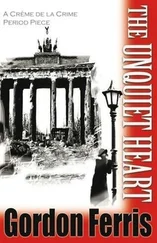The man yanked the umbrella away. “What do you want?” he asked.
“I know who you are.”
“Do you want some change, is that the idea? Well, I don’t have any change to give you. You should get a job.”
The man returned the umbrella above his head and resumed walking.
“Hey, don’t walk away from me.”
Tim had to move quickly to remain at the man’s side. He looked around for others on the street with them but there was no one. The city seemed to have cleared out.
“Find someone else to harass,” said the man. “I have no change for you.”
“I know who you are,” said Tim.
“You’re obviously a lunatic.”
Tim reached out to grab hold of the man’s arm. With one graceful move the man slipped his grasp and retreated two paces. In the process he abandoned the umbrella. It spun like a dying top on the sidewalk. When Tim looked at the man, he saw that he was standing oddly erect, his two hands lightly fisted.
“You must stop harassing me,” he cried loud enough for anyone to hear.
“You know something about the murder of Evelyn Hobbs,” said Tim. “The police want to talk to you.”
“Fine,” the man said, again too loudly, “take the umbrella. Just leave me in peace and you can have the umbrella.”
The man walked sideways toward the corner of 7th and A. He raised one hand to hail a cab, but the street was just then empty of all cars except those parked at the curb.
Tim approached him cautiously. “I’m not letting you out of my sight.”
“You are a lunatic!” cried the man.
“You and I need to go to the police.”
Finally a single cab appeared in the distance. The man held up his hand. “Do not come any closer,” he said to Tim.
Tim took another step forward. “I’m not letting you inside that cab.”
The cab aimed its way toward them. He grabbed the man just as he was reaching for the door. He got hold of his upper body and clasped him from behind in a bear hug. The man swiveled with Tim on his back and slammed him against the rear door of the cab, knocking the wind out of him. He had a raw vital power all out of proportion to his pale demeanor. His struggle was a practiced struggle, his resistance a trained one. Pinned against the cab, Tim gasped for air. The cabbie stepped out but then stood there frozen, staring from the open door. Tim told himself he just needed to hold on until someone called the police. The police would take them in, they would identify the man, they would finally have the man in custody. But then he was lifted off his feet and lofted into the air, thrown right over the man’s back, and landed hard on the curb. He lay, stunned, half on the sidewalk, half on the street.
The man hovered over him and grabbed his jaw like an angry mother. He got close and looked him in the eye. “You forget me now,” he whispered, “or I will kill your wife and daughter. Do you understand?”
“Yes.”
“Forget me.”
“Okay.”
Tim stared up at the dense sky for he didn’t know how long. Only his eyes moved, blinking involuntarily when a raindrop landed close by. Someone finally came over.
“Where’d he go?” asked Tim.
“Are you okay?”
“Where’d that man go?”
The stranger looked up. “What man?”
In the days that followed, Tim reengaged Fritz Weyer. Fritz showed the sketch to the guys who ran the baths. No one recognized the face. Tim told Fritz to keep searching. He was confident the man lived in the area. He said nothing about the fact that he and the man seemed to be the only two people in the entire city at the moment of their encounter.
The details of the Ellison deposition came back to him, unbidden, while he sat at the bar, and he couldn’t see any reason why it precluded summary judgment in Keibler. The credibility dispute issue was highly debatable. And as for Horvath, whatever that was, there was always a way around precedent.
But was someone in Masserly’s office guffawing at him?
He was on his way back to the office to find out when his cab slowed for a light. He peered over at a garbage truck, where a man in corn-colored gloves was just then stepping off the truck’s ledge. From the street corner the man dragged one of the city’s green mesh bins over to the truck’s hopper and tossed it in, shaking it twice with quick indifference before returning it and resuming his weary perch on the ledge.
As Tim watched him, he thought despite all that man must see of the city on any given day, he probably noticed none of it. He put in his eight hours of garbage and went home. His memories were of stench, stickiness, weighty bins. That was no way to live. If you want to do it right, he thought, you have to get down on your hands and knees and crawl inch by inch across the earth, stopping occasionally to touch your cheek to the ground.
So then what was he doing in a cab?
“Can you let me out here please?” he asked the driver.
He paid and stepped to the curb. He was still far from the office. He stood on the street corner in his new coat and pulled his gloves tight. He watched the people passing by on the opposite side of the street, the cars thundering past, the unyielding permanent motion of the city. He stood absolutely still. The first of a spring snow was beginning to fall. It collected on his shoulders. The wind bum-rushed him from the west, filling his eyes with tears. He squinted and took a close look at a building across the way, the three whipping flags mounted above the revolving door, the green scaffold poles. A cluster of exiled smokers hovered around the entrance. Closer by, pigeons cooed and balked. A stout Hispanic woman in sandwich boards stood on the street corner mutely passing out flyers for discount men’s clothing. Metal burned bitterly from a pretzel vendor’s cart.
Maybe they let him return not because they were generous, but because they were cruel. They knew the greatest way to punish him was not to freeze him out forever, but to put him within reach of real work every day and then to deny him and deny him.
He walked down to the West Village. He sat for a spell on the stoop leading up to a brownstone. The sun had fled from the block and was rapidly disappearing from the city altogether while casual flakes drifted in the air. The exposed brick, the cement stairs, the small ironwork gates, the tin garbage cans, the protective grilles overlaying the windows of the garden apartments — all radiated a falling night’s cold. The cars parked along the curb were naked and cold.
A woman emerged from a brownstone across the street. She was accompanied by a couple. The three of them stood on the stairs a moment before shaking hands and saying good-bye. The woman remained on the stoop and looked in both directions as if expecting someone. He noticed a For Sale sign posted on the brownstone.
He walked across the street and introduced himself. He told the woman he was a partner at Troyer, Barr. Quick to recognize the name of the firm, she immediately invited him in. She was trim, smartly dressed, and full of rehearsed speech. They entered the parlor-floor apartment. He walked to a recess of windows where he admired the view. The woman stood behind him, in front of the fireplace. She broke her monologue occasionally to say, “Let’s see… what else…” He stared through the darkening glass as it began to reflect more of his warm and motionless silhouette than the stuff of the outside world.
“Would you mind turning off that light?” he asked.
The woman walked to the kitchen, her shoes clapping against the hardwood floor. The room fell into darkness, and his reflection in the window faded. Outside, lit windows made a lambent patchwork in the brownstones across the street. The buildings were built of white brick and red brick and the brick of fall colors. Residents walked down the street toward home as softly as the falling snow. He resolved to call Kronish. They weren’t going to let him back in. And what did it matter anyway.
Читать дальше












